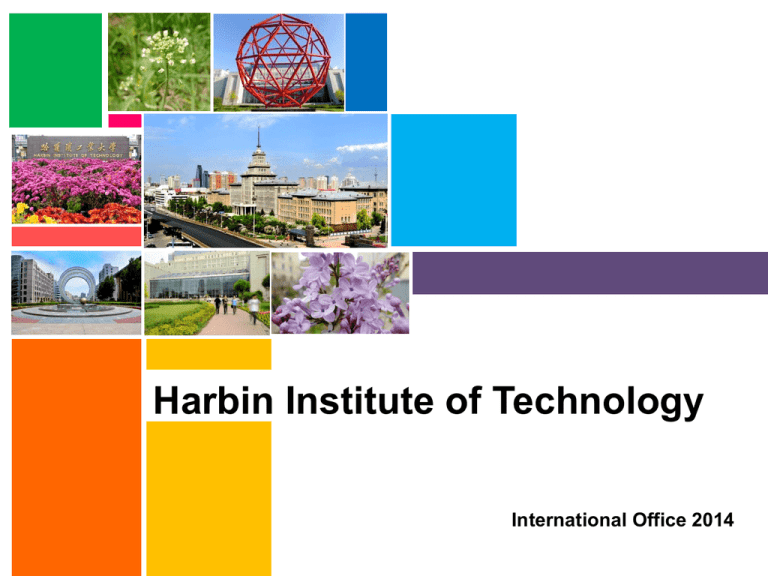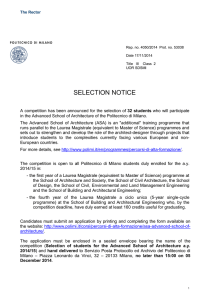(HIT), with science, engineering and research as its core
advertisement

Harbin Institute of Technology International Office 2014 Overview Founded in 1920, Harbin Institute of Technology (HIT), with science, engineering and research as its core, encompassing management and liberal arts, economy and law, is now developing into an open, multi-disciplinary and world-class university. Faculty Member (full-time): Professors: Academicians of CAS and CAE: Student enrolled: 6,981 1,040 33 50,174 (Harbin) Location Harbin Campus Full-time undergraduate students: 30,287 Master’s students: 7,733 Doctoral students: 4,686 Campus area: 3,474,876m2 Branch Campus (Weihai) Full-time undergraduate students: 10,620 Master’s students: 412 Campus area: 1,228,956m2 Branch Campus (Shenzhen Graduate School) Master’s students: 2,203 Doctoral students: 312 Campus area: 141,800m2 Harbin Campus B A C B: Harbin Second Campus A: Harbin Main Campus C: Harbin Scientific Park School of Architecture, close to A 1920 1949 1950’s 1960’s Founding of Harbin Sino-Russian School for Industry Postgraduate program 1 of 2 university models studying from USSR 1 of 6 national key universities, the only one outside of Beijing 23 Majors in 7 Departments 800 academic staff, 800 students, 67 Russian and Czechoslovakia experts 1984 1 of 15 universities to receive preferential support from government 1996 The first batch of universities in Project 211 1999 One of the top universities in Project 985 2009 A member of Top Nine University Consortium (C9) in China 2013 The First batch of universities in 2011 Scheme by Ministry of Education in China … … Undergraduate programs: Master programs: Doctoral programs: Academic schools: National Key Primary Disciplines: National Key Laboratory: Ministry Level Key Laboratory: 87 41 27 20 9 8 42 9 National Key Primary Disciplines • • • • • • • • • Mechanics Mechatronics Engineering Instrumental Science and Technology Materials Science and Engineering Power Engineering and Engineering Thermophysics Control Science and Engineering Computer Science and Technology Civil Engineering Management Science and Technology In 2013, the Discipline Evaluation by Ministry of Education in China had been announced and HIT had 10 primary disciplines ranking forefront among all the 95 primary disciplines from 391 universities. Ranking No.1: Mechanics Ranking No.2: Environmental Science & Engineering Civil Engineering Ranking No.3: Materials Science & Engineering Control Science & Engineering Ranking No.4: Computer Science & Technology Instrumental Science & Technology Aeronautical and Astronautical Science &Technology Ranking No.5: Mechatronics Engineering Optical Engineering 8 National Key Laboratories • State Key Laboratory of Advanced Welding and Joining • National Key Laboratory for Precision Hot Forming of Metals • State Key Laboratory of Urban Water Resource and Environment • State Key Laboratory of Tunable Lasers Technology • State Key Laboratory of Robotics and System • National Key Laboratory of Science and Technology on Advanced Composites in Special Environment • National Key Laboratory for Space Materials Behavior and Evaluation • National Engineering Laboratory for Coal-Burning Pollutants Emission Reduction 4 National Engineering Research Centers • National Engineer Research Center of Urban Water Resources • Ultra-Precision Machining Research and Application Center for National Defense Science & Technology Industry • State and Local Joint Engineering Research Center of Cold Region Low Carbon Architecture Technology • Welding Automation Research and Application Center for National Defense Science & Technology Industry Schools and Departments • • • • • • • • • School of Astronautics School of Electronics and Information Engineering School of Mechatronics Engineering School of Materials Science and Engineering School of Energy Science and Engineering School of Electrical Engineering and Automation School of Science School of Chemical Engineering and Technology School of Economy and Management • • • • • • • • • • • School of Civil Engineering School of Municipal and Environmental Engineering School of Architecture School of Transportation Science and Technology School of Computer Science and Technology School of Software School of Humanities and Social Sciences School of Food Science School of Law School of Foreign Languages School of Life Science and Engineering Scientific Research Funding in the latest five years (In Billion RMB) 2.40 2.257 2.00 1.60 1.892 1.928 2010 2011 2.31 1.595 1.20 0.80 2009 2012 2013 The Research Funding of HIT has been increasing since the last decade and the total amount of funding is over 100 billion RMB which is among the top in China. Scientific Papers Type of Paper Total amount Ranking in Chinese universities CPCI-S Paper 825 No. 1 EI Paper 3,069 No. 2 SCI Paper 2,345 No. 10 ESI Highly Cited Papers (last 10 years) 174 No. 9 ESI Hot Papers (last 2 years) 24 No. 3 The number of ESI Papers of 7 disciplines ranks 1% globally Same as previous Increasing 6 positions Increasing 21 positions Increasing 8 positions Increasing 51 positions Increasing 37 positions Newly entered in 2013 Materials Science Ranking No.6 Engineering Ranking No. 20 Physics Sciences Ranking No. 87 Computer Science Ranking No.95 Chemistry Ranking No.164 Environmental Science and Ecology Ranking No.228 Mathematics Ranking No.105 Patent of Invention • HIT applied 1,257 patents of invention (authorized 871) in 2012, and the number is continually over 1,000 in the previous past three years. • HIT is authorized with 871 patents of invention, ranking No.3 among all Chinese universities Threr are 2,533 effective patents of invention, ranking No.4 among all Chinese universities. • The patent applications and authorization in the recent five years Space Environment Simulation and Research Infrastructure (SESRI) • • • Fills in the blank in national simulation facilities, comprehensive space environment interacting with the material science research platform in the integrated environment of large space Granted the national funds of 1.5 billion RMB to construct 9 sub-system and its supporting infrastructure. Integrates and develops multi-disciplines and promotes HIT towards developing into a world famous university Aarhus University HIT has signed academic cooperation agreements of friendship with 297 institutions of higher education in 41 countries. Russia 1. Pacific National University 2. Moscow State Technical University Named After N.E Bauman 3. Samara State Aerospace University 4. Moscow Power Engineering Institute 5. Lomonosov Moscow State University 6. St. Petersburg State University 7. St. Petersburg State Technical University 8. Novosibirsk State Technical University 9. Amur State University 10. Russian State University of Management 11. Siberian Federal University 12. National Maritime University 13. Ural State Technical University 14. Irkutsk State Linguistic University 15. Russian Far East Federal University U.K. 1. 2. 3. 4. 5. University of Manchester University of Birmingham University of Bath Queens University Belfast University of Sheffield Ireland 1. University College Dublin 2. Dublin Institute of Technology Sweden 1.Royal Institute of Technology 2. University of Gothenburg Denmark 1. TU Denmark 2. Aarhus University The Netherlands 1. TU Delft Germany 1. TU Munich France 1. Sorbonne Universities 2. UT Group 3. Agrocampus Rennes 4. University of Bordeaux 1 5. Mines-Telecom 6. Arts et Metiers Paris-Tech 7. INSA Group 8. Lille University of Science and Technology Austria 1. University of Applied Sciences Wiener Neustadt Italy 1. Politecnico di Torino 2. Politecnico di Milano 3. University of Sassari Spain 1. Universitat Politecnica de Catalunya 2. Universidad Politecnica de Madrid Canada 1. York University 2. University of Waterloo 3. University of Calgary 4. Trinity Western University United States 1. University of Maryland 2. Purdue University 3. Missouri University of Science and Technology 4. Washington State University 5. University of Texas--Dallas 6. Florida Institute of Technology 7. The University of Arizona 8. State University of New York at Stony Brook Australia 1.The University of Adelaide 2.The University of Newcastle 3.The University of Sydney 4.The University of Western Australia 5.Monash University 6.The University of Queensland 7.The University of New South Wales New Zealand 1. Auckland University of Technology 2. The University of Auckland South Korea 1.Seoul National University 2.KAIST 3.Korea University 4.Kyungpook National University 5.Hanyang University 6.Incheon University Japan 7.Sogang University 1. Tokyo Institute of Technology 8.Sungkyunkwan University 2. Waseda University 9.Pohang University of Science and Technology 3. Sophia University 10.Yonsei University 5. Tohoku University 11.Pusan National University 6. Kumamoto University 12.Inha University 7. Nagoya University 13.Ewha Womans University 8. Hokkaido University 14.GIST 9. Chiba Institute of Technology 4. The University of Tokushima 10.Niigata University 11.Ritsumeikan Asia Pacific University 12.Kyoto University 13.Yamagata University Singapore 1. National University of Singapore Taiwan 1.National Taiwan University 2.National Tsing Hua University 3.National Chiao Tung University 4.National Cheng Kung University 5.National Taiwan University of Science and Technology 6.National Sun Yat-sen University 7.National Central University 8.Feng Chia University 9.Soochow University 10.I-Shou University 11.Chinese Culture University 12.National Yunlin University of Science and Technology 13.Fu Jen Catholic University 14. Yuan Ze University Hong Kong 1.The Hong Kong University of Science and Technology 2.University of Hong Kong 3. The Chinese University of Hong Kong 4. The Hong Kong Polytechnic University HIT has sent 1,652 students to study abroad, and received 1,881 international students from 106 countries and regions in 2013. HIT received 2,720 specialists and scholars from abroad for academic in 2013.
